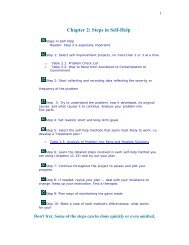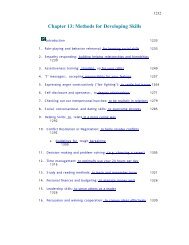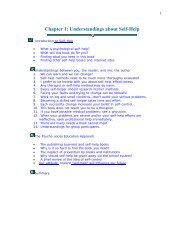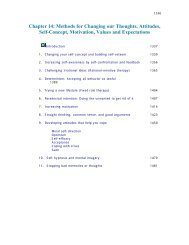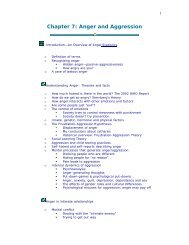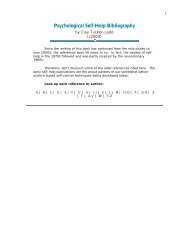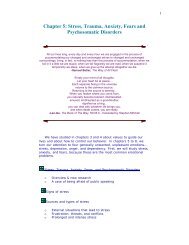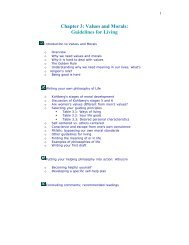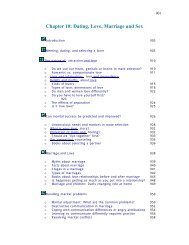Methods for Changing Behaviors - Psychological Self-Help
Methods for Changing Behaviors - Psychological Self-Help
Methods for Changing Behaviors - Psychological Self-Help
Create successful ePaper yourself
Turn your PDF publications into a flip-book with our unique Google optimized e-Paper software.
"correction" (must make up <strong>for</strong> the harm done by the unwanted<br />
behavior), and "over-correction" (more than make up <strong>for</strong>, e.g.<br />
if you haven't done your share of the dishes <strong>for</strong> two days, you<br />
must make up <strong>for</strong> the dish washing you have missed plus wash<br />
and wax the floor as well). Common penalties include giving a<br />
lot of money to hated causes, having to publicly confess one's<br />
sins, etc.<br />
4. <strong>Self</strong>-criticism--talking to yourself like a critical parent can be<br />
punishing: "you can do better than that!" or "that's a dumb<br />
thing to say, why don't you learn more about this" or "if you<br />
had spent more time preparing, you wouldn't have been so<br />
embarrassed" or "you should be doing this perfectly by now,<br />
what is wrong with you any how?"<br />
5. Confronting the real consequences--list the disadvantages and<br />
dire possible consequences, especially long-term ones we tend<br />
to overlook. This is particularly good <strong>for</strong> harmful, expensive<br />
habits, like drinking, drugs, smoking, overeating, gambling,<br />
reckless driving, and so on. Example: suppose you have a quick<br />
temper and a tendency to blame and criticize others. There are<br />
lots of disadvantages: it's hard on your body, it interferes with<br />
being empathic and caring, it jeopardizes every relationship<br />
(with parents, children, spouse, co-workers), and it <strong>for</strong>ebodes<br />
an unhappy life in many ways. Dwelling on these outcomes can<br />
punish the unwanted behavior.<br />
Don't exaggerate the awful consequences, just be honest.<br />
Consider what could be done instead of the unwanted behavior,<br />
e.g. how could the time, perhaps 10, 000 hours, and $10,000<br />
to $50,000+ be spent in a more loving way than drinking? How<br />
could the time, energy, and thought spent on hate, fruitless<br />
arguing, and blaming in a life-time be better spent? My favorite<br />
example is that most 18-year-olds could probably have a MD or<br />
Ph.D. if he/she had given up TV and music.<br />
6. Have horrible fantasies--using the list of disadvantages, it may<br />
be helpful to vividly face the awful possible outcomes of the<br />
unwanted behavior. Examples: the smoker can read about and<br />
get a clear picture of lung cancer and heart disease made more<br />
likely by smoking. You might even do volunteer work at a<br />
hospital to get a better picture. The angry person can imagine<br />
being dissatisfied with his/her spouse, having terrible fights<br />
brought on by critical, demanding, derogatory comments,<br />
hurting the person who has been closest to him/her, and<br />
ending up being divorced, bitter and alone until he/she dies.<br />
7. You may want help from others in administering the<br />
punishment--just letting others know your self-control is failing<br />
may be punishing, especially if you have a rule that you have to<br />
show others your bitten fingernails or the roll of fat on your<br />
stomach or how little work you have done. Friends can also<br />
punish you at your request: they can remind you of your goals,<br />
they can criticize, they can give away money or valued<br />
possessions if you fail to reach a goal, they can refuse to do<br />
things with you, etc.<br />
1143



